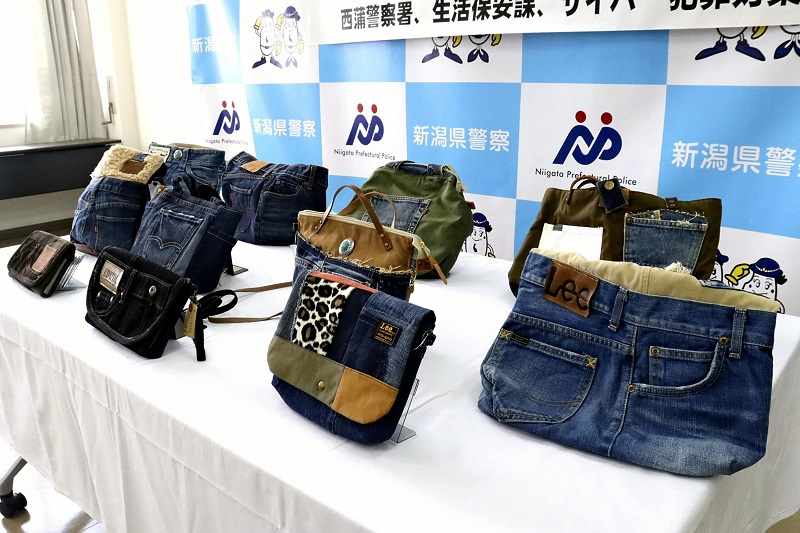
Refurbished bags and similar items using jeans fabric with name-brand logos, which were put on sale illegally and later confiscated by police, are on display at the Niigata Prefectural Police premises. This photo was taken in August in Niigata.
20:00 JST, November 1, 2022
Since the COVID-19 pandemic started, handmaking things at home has become popular. But the hobby has also brought about a problem: selling goods that are remade with parts of genuine brand-name items can constitute an infringement of trademark rights, and the seller may be caught by police.
In July, two women in their 40s were arrested by the Hyogo Prefectural Police on suspicion of violating the Trademark Law by selling handmade goods such as pouches and pochettes using part of an authentic scarf bearing the brand name and logo of the luxury brand “Hermes.”
According to the prefectural police, these two women were Hermes enthusiasts, and most of the customers who purchased their refurbished goods through Instagram were also Hermes fans. The sellers reportedly told police that “lots of people are doing it online, so we didn’t know that it was illegal.”
In August, a woman in her 50s was arrested by the Niigata Prefectural Police on the same charge for trying to sell bags refurbished using jeans fabric with a Levi’s tag.
It is acceptable for people to remake name-brand goods for their own personal use. However, selling them constitutes an infringement of the manufacturer’s trademark rights. Sei Saito, a patent attorney belonging to the Japan Patent Attorneys Association, said, “Consumers may mistakenly assume that the product is an authentic item made and sold by the brand, even though it has been refurbished.”
A 61-year-old part-time worker living in Saitama Prefecture who found a smartphone case with a large brand logo being sold on a flea market app said, “I was almost under the misapprehension that the brand was also selling smartphone cases.”
Mercari, a flea market app that also sells many handmade items, prohibits the sale of things that have been remade using genuine brand-name products. To make it easier for potential buyers to search for items they like, many such products have been listed with such descriptions as, “in a so-and-so [brand name] style.” But Mercari banned even this type of description in September 2020.
There are also cases of handmade goods using fabrics and parts of accessories of well-known brands needing to be sold with caution.
Marimekko, a Scandinavian brand of homewares, sells a fabric with a large poppy print called Unikko, which is popular among people who make bags and pouches by hand. However, the company’s marketing agency in Japan said: “Our fabric is for customers to enjoy themselves. We hope they would refrain from using it for commercial purposes.”
Hiroko Nagakawa, representative director of the Japan Handmade Accessory Association, said she had warned a participant in an association-run workshop who had sold accessories made using luxury brand packaging ribbons stiffened with resin. Nagakawa said she would tell the participants, “Enjoy making things by hand by valuing the image and originality you have created.”
Top Articles in Society
-

Producer Behind Pop Group XG Arrested for Cocaine Possession
-

Man Infected with Measles Reportedly Dined at Restaurant in Tokyo Station
-

Man Infected with Measles May Have Come in Contact with Many People in Tokyo, Went to Store, Restaurant Around When Symptoms Emerged
-

Woman with Measles Visited Hospital in Tokyo Multiple Times Before Being Diagnosed with Disease
-

Australian Woman Dies After Mishap on Ski Lift in Nagano Prefecture
JN ACCESS RANKING
-

Producer Behind Pop Group XG Arrested for Cocaine Possession
-

Japan PM Takaichi’s Cabinet Resigns en Masse
-

Man Infected with Measles Reportedly Dined at Restaurant in Tokyo Station
-

Israeli Ambassador to Japan Speaks about Japan’s Role in the Reconstruction of Gaza
-

Videos Plagiarized, Reposted with False Subtitles Claiming ‘Ryukyu Belongs to China’; Anti-China False Information Also Posted in Japan



















